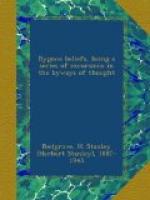But PYTHAGORAS needed a greater audience than one man, however enthusiastic a pupil he might be, and he left Samos for Southern Italy, the rich inhabitants of whose cities had both the leisure and inclination to study. Delphi, far-famed for its Oracles, was visited en route, and PYTHAGORAS, after a sojourn at Tarentum, settled at Croton, where he gathered about him a great band of pupils, mainly young people of the aristocratic class. By consent of the Senate of Croton, he formed out of these a great philosophical brotherhood, whose members lived apart from the ordinary people, forming, as it were, a separate community. They were bound to PYTHAGORAS by the closest ties of admiration and reverence, and, for years after his death, discoveries made by Pythagoreans were invariably attributed to the Master, a fact which makes it very difficult exactly to gauge the extent of PYTHAGORAS’ own knowledge and achievements. The regime of the Brotherhood, or Pythagorean Order, was a strict one, entailing “high thinking and low living” at all times. A restricted diet, the exact nature of which is in dispute, was observed by all members, and long periods of silence, as conducive to deep thinking, were imposed on novices. Women were admitted to the Order, and PYTHAGORAS’ asceticism did not prohibit romance, for we read that one of his fair pupils won her way to his heart, and, declaring her affection for him, found it reciprocated and became his wife.
SCHURE writes: “By his marriage with Theano, Pythagoras affixed the seal of realization to his work. The union and fusion of the two lives was complete. One day when the master’s wife was asked what length of time elapsed before a woman could become pure after intercourse with a man, she replied: `If it is with her husband, she is pure all the time; if with another man, she is never pure.’” “Many women,” adds the writer, “would smilingly remark that to give such a reply one must be the wife of Pythagoras, and love him as Theano did. And they would be in the right, for it is not marriage that sanctifies love, it is love which justifies marriage."[1]
[1] EDOUARD SCHURE: Pythagoras and the Delphic Mysteries, trans. by F. ROTHWELL, B.A. (1906), pp. 164 and 165.
PYTHAGORAS was not merely a mathematician. he was first and foremost a philosopher, whose philosophy found in number the basis of all things, because number, for him, alone possessed stability of relationship. As I have remarked on a former occasion, “The theory that the Cosmos has its origin and explanation in Number . . . is one for which it is not difficult to account if we take into consideration the nature of the times in which it was formulated. The Greek of the period, looking upon Nature, beheld no picture of harmony, uniformity and fundamental unity. The outer world appeared to him rather as a discordant chaos, the mere sport and plaything of the gods. The theory of the uniformity of Nature—that




